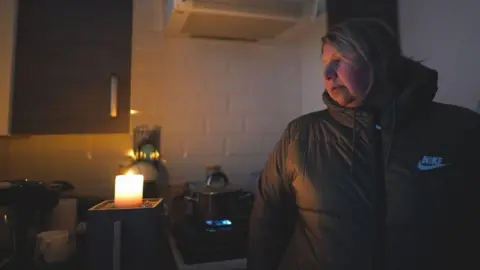Storm power cuts: Maximum compensation nearly triples to £2,000
 Getty Images
Getty ImagesThe maximum amount of compensation households and firms can claim for power cuts due to storms has nearly tripled under new rules.
The cap has gone up from £700 to £2,000, said energy watchdog Ofgem.
It follows a review into the response to Storm Arwen, when nearly one million homes and businesses lost power - thousands for several days.
An Ofgem director said the "tough new rules" would ensure energy companies prepare better for severe weather.
The energy watchdog's review focused on how distribution network operators - the companies which link up homes and businesses to the electricity network - responded to Storm Arwen in November 2021.
Some 40,000 consumers had power cuts lasting three days. In parts of north England and north-east Scotland, almost 4,000 people had no power for more than a week.
The latest changes from Ofgem will mean customers receive higher levels of compensation faster to better reflect the impact of prolonged cuts.
If the severe weather event is deemed a category 1 storm, customers will be entitled to £80 compensation if their supply is not restored after 24 hours.
For storm category 2, the most severe, consumers will be entitled to £80 compensation if their supply is not restored after 48 hours, reflecting the fact that it might take companies longer to restore power where conditions are more challenging.
For both categories, customers will now be eligible for an extra £40 for every six hours they are without power after the initial period described. This is down from every 12 hours previously.
It works out as a maximum of £2,000 that a customer might receive if they are without power for 13 days for a category 1 storm, or 14 days for category 2.
Consumers will also be able to be paid by bank transfer in a bid to speed up the payment process.
Akshay Kaul, director general of infrastructure for Ofgem, said: "It's unacceptable that thousands of households were left without power in freezing conditions for a prolonged period during Storm Arwen, often with poor information about when their power would be restored."
Out of pocket
For Ben Walker from Northumberland, the new rules should have been more generous for people living in rural areas.
He and his partner moved into their new home on the day Storm Arwen struck. He said he was refused the full amount of compensation due to the fact their electricity came via a sub-metre from their landlady's supply and they were treated as one household.
 Ben Walker
Ben Walker"If there is compensation, it should be equally balanced between those who need it - those on the breadline and in rural parts of the country."
They were left without power for six days and no water due to the fact it is pumped to their rural property from a nearby location.
Mr Walker estimated they spent hundreds of pounds on "crates and crates" of water, replacing food that went off and wood for the log burner. The couple received about £200 in compensation.
"The storm comes along… and it's one of those things, an act of God - but it is an essential utility so you can see how it will have a huge impact.
"It is a huge pain and costs you a lot more money in a rural environment, where you have 60-mile round trips to the supermarket for essentials."
Mr Kaul added that bouts of extreme weather were only likely to increase because of a changing climate, "so we need to make sure network services are resilient".
Ofgem said network companies that fail to follow the rules could face multimillion pound fines.
Providers such as E.On Next, Octopus Energy and Good Energy were previously fined £8m in total for failing to pay compensation in time for missing final bill deadlines.
 Getty Images
Getty ImagesThe announcement comes as National Grid ESO confirmed it will reintroduce the discount offers for households to use less electricity at peak times seen last winter.
The Demand Flexibility Service was first launched last November after Russia's gas supplies to Europe were disrupted following the invasion of Ukraine.
Only homes with smart meters were able to take part.
Households and businesses taking part will again be asked by their suppliers to reduce their peak-time electricity use if they can during a specific period identified by National Grid across 12 "test days", which will take place between this November and the end of March 2024.
The tests will most likely fall on weekday evenings, when electricity usage peaks.

What can I do if I can't afford my energy bill?
- Check your direct debit: Your monthly payment is based on your estimated energy use for the year. Your supplier can reduce your bill if your actual use is less than the estimation.
- Pay what you can: If you can't meet your direct debit or quarterly payments, ask your supplier for an "able to pay plan" based on what you can afford.
- Claim what you are entitled to: Check you are claiming all the benefits you can. The independent MoneyHelper website has a useful guide.

